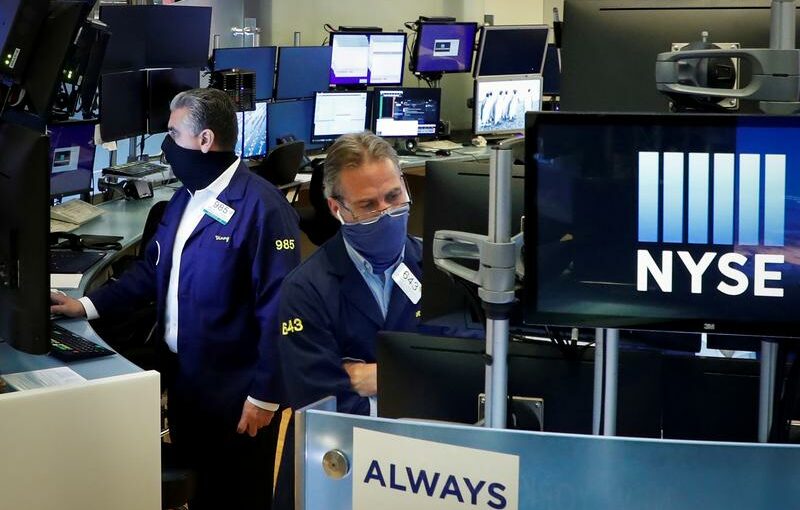(Reuters) – The S&P 500 and the Nasdaq edged slightly higher after slipping from record levels in volatile trading on Wednesday, as energy and financials rose but some big tech stocks limited those gains amid an ongoing rotation of portfolio holdings.
Remarks by Federal Reserve Chairman Jerome Powell that there should be no expectation of withdrawing support to the economy before the coronavirus pandemic is under control appeared to help lift the S&P 500 slightly into the black.
Tesla Inc’s 4.6% slide and drops of 1% or less by Amazon.com Inc’s, Microsoft Corp and Apple Inc weighed the most on the S&P 500 and the Nasdaq.
The consumer discretionary index, down 1.1%, was the biggest drag on the S&P, with information technology another drag. On the upside, energy rose 1.4% and financials gained 0.2%.
A broadening of market leadership is underway with the focus on big tech easing off and sectors such as energy and financials gaining traction, said David Bahnsen, chief investment officer at The Bahnsen Group in Newport Beach, California.
“Is the whole market still reliant on big tech as it clearly was last summer? I think the answer is increasingly becoming ‘no,’ you’re seeing a broadening of market leadership,” Bahnsen said. “You have over 75% of the S&P 500 trading above its 200-day moving average. That’s remarkable breadth.”
The Russell 1000 value index, which is heavily weighted towards cyclical sectors, rose 0.1%, while its growth index, comprising large tech companies, fell 0.2%.
Shares of cannabis companies soared as the Reddit forum that pushed GameStop to record levels late last month extended a months-long rally on bets of decriminalization under the administration of U.S. President Joe Biden.
Wall Street’s fear gauge spiked to a one-week high of 23.85 points before paring gains to trade 3.1% higher.
Twitter Inc added about 7.6% after it forecast a strong start to 2021 as ad spending rebounds from a rock bottom.
The social media platform has thought about whether to hold bitcoin on its balance sheet, but it has not made any changes yet, Chief Financial Officer Ned Segal told CNBC.
“The big question is sensitivity to valuation,” said Bahnsen, adding that at 23 to 25 times forward earnings there’s no question certain stocks are highly valued.
“We’re overbought but there’s a lot of sectors that haven’t participated as well … and rotation into these pockets always seems to keep this market floating,” said Dennis Dick, a proprietary trader at Bright Trading LLC in Las Vegas.
Bets on more fiscal aid and swift vaccine distribution have powered the main U.S. stock indexes to a series of all-time peaks recently.
Biden on Tuesday agreed to a proposal by Democratic lawmakers to limit or phase out stimulus payments to higher-income individuals as part of his administration’s $1.9 trillion coronavirus relief bill.
“The dominating feature to these markets remain low interest rates, the passage to Biden’s package – whether it’s as big as they hoped or whether it’s a slightly scaled down version,” said Rick Meckler, a partner at Cherry Lane Investments in New Vernon, New Jersey.
At 2:38PM ET, the Dow Jones Industrial Average rose 66.95 points, or 0.21%, to 31,442.78, the S&P 500 gained 3.75 points, or 0.10%, to 3,914.98 and the Nasdaq Composite added 6.86 points, or 0.05%, to 14,014.56.
Data on Wednesday showed U.S. consumer prices rose moderately in January but underlying inflation remained benign amid a pandemic that has fractured the labor market and services industry.
Fourth-quarter earnings have so far also exceeded expectations, supporting sentiment.
Lyft Inc jumped 5.6% after the ride-hailing firm said it is chopping costs and now expects to be profitable in the third quarter.
Advancing issues outnumbered decliners by a 1.1-to-1 ratio on the NYSE and on the Nasdaq.
The S&P 500 posted 44 new 52-week highs and no new low, while the Nasdaq recorded 576 new highs and 29 new lows.
Source: Read Full Article
